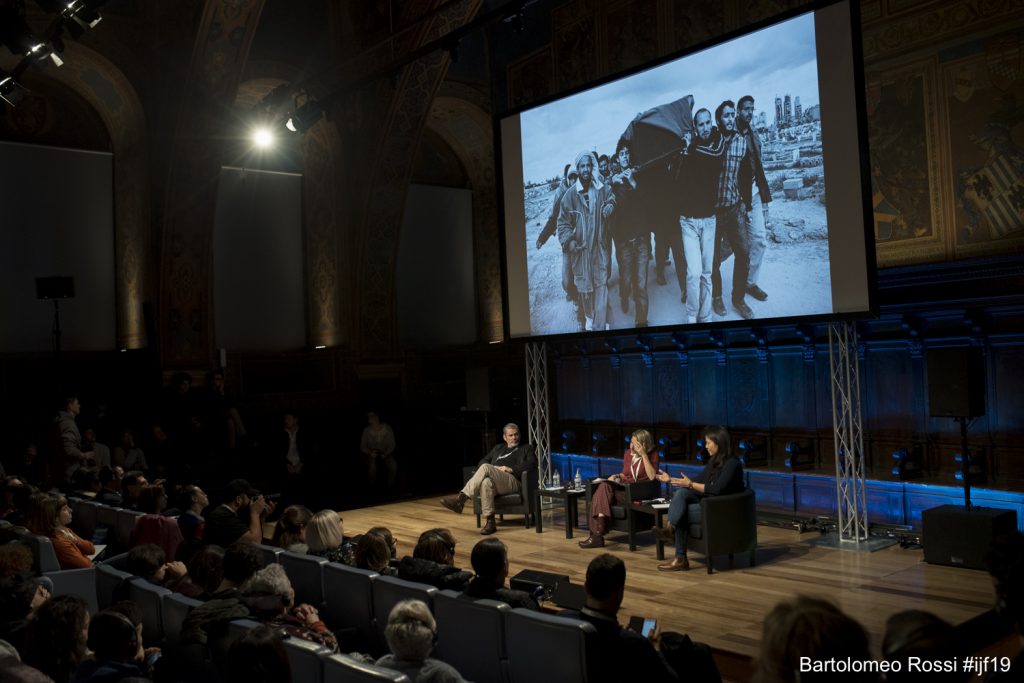Stay up to date by subscribing to our Newsletter or by following our Telegram channel, and join the conversation on Facebook, Twitter, and Instagram.
Edited by Marco Nurra
Watch all #ijf19 sessions on-demand: media.journalismfestival.com
Deepfake technology is changing fast — use these 5 resources to keep up. Since Vice first profiled that Redditor in late 2017, “deepfake” has come to mean a video that has been digitally manipulated so well that it may be difficult for the average viewer to tell it is fake. Today, deepfakes are even easier to produce. A deepfake can be made with just a few photographs. Tools and methods for creating realistic but fake audio have also cropped up. So-called cheapfakes don’t need to be sophisticated to be believed. “Sometimes we set the bar too high on the effectiveness of media manipulation techniques, expecting that high fidelity equates to impact,” says Joan Donovan (#ijf19 speaker), director of the Technology and Social Change Research Project at the Harvard Kennedy School’s Shorenstein Center. “However, small changes to pre-existing video, audio and images present the same challenges for audiences.” We tackled this topic at #ijf19:
🎥 Deepfakes, shallow fakes and real deal journalism – #ijf19 on-demand
— journalism festival (@journalismfest) June 28, 2019
with @edbice, @albamoraroca, @slifty, @Tom_El_Rumi https://t.co/npavzuhiOH
🎥 Prepare, don’t panic: dealing with deepfakes and other synthetic media – #ijf19 on-demand
— journalism festival (@journalismfest) June 28, 2019
with @SamGregory https://t.co/bCfcKyMjOc
What’s behind the Washington Post’s guide to manipulated video. A conversation with Glenn Kessler, editor of The Fact Checker, about their project to create a ‘universal vocabulary’ for labelling video manipulation.
On the frontline (Podcast): why has environmental journalism become so dangerous? The field of environmental journalism is now one of the most dangerous after war reporting. The investigative reporter Juliette Garside and the global environment editor, Jonathan Watts, discuss why journalists are facing rising levels of violence.
Yes, it’s worth arguing with science deniers. “Arguing with the anti-vaxxers/flat earthers/climate change deniers may feel futile, but research just published in Nature Human Behaviour suggests that it’s actually worth it and can be effective.”
Six ways to write for climate-sceptic audiences. “Understanding the perspective of climate change deniers is crucial to the process of bridging the gaps between communities, which is something journalists should strive towards.”
The skills every digital investigator needs. Bellingcat’s Nick Waters talks through the essentials of open source intelligence. Nick Waters was a #ijf19 speaker:
🎥 Track changes: how to use open-source information to identify and monitor environmental issues – #ijf19 on-demand https://t.co/dMZ1DdG29G
— journalism festival (@journalismfest) June 24, 2019
with @N_Waters89, @wammezz pic.twitter.com/IwnMWsfdcZ
🎥 How newsrooms can incorporate open-source investigation techniques – #ijf19 on-demand
— journalism festival (@journalismfest) June 24, 2019
with @MirandaOCCRP, @Tom_El_Rumi, @N_Waters89 https://t.co/jIEpZSoWAx
The Capital Gazette shooting: One year later. Today marks the one-year anniversary of a shooting at the Capital Gazette newspaper in Annapolis, Maryland, in which Rebecca Smith, Wendi Winters, Rob Hiaasen, Gerald Fischman and John McNamara were killed.
Target by Duterte. “As Duterte’s administration and its proxies astroturf social media with propaganda, a lie told a million times becomes the truth.” Maria Ressa was a #ijf19 speaker:
🎥 The mission of journalism: #ijf19talk by @mariaressa – #ijf19 on-demand https://t.co/pXVTfrOpW0
— journalism festival (@journalismfest) June 24, 2019
(moderated by @Indira_L) pic.twitter.com/Yosel112XE
Australia: ABC launches court action over police raid. The ABC has launched Federal Court action to set aside a search warrant that authorised the Australian Federal Police raid on the national broadcaster’s Sydney headquarters, while News Corp is poised to follow suit over an earlier raid on a journalist’s home.
Breaking the silence about corruption in Spain’s press. A new book by a former editor-in-chief of El Mundo has opened a debate about the relationship between business and the media.
Twitter says it will label tweets from Trump and other leaders that break its rules. Twitter has in the past allowed tweets from Trump and other world leaders to remain online, even though they broke the company’s rules, because it believes the tweets are in the public interest. Now the company plans to place a disclaimer on future tweets from world leaders that break its rules.
Chrome’s privacy changes are a humbling reminder for subscription publishers. Publishers will soon no longer be able to detect when you’re in Chrome’s incognito mode, weakening paywalls everywhere. As a possible workaround, a Google spokesperson proposed that sites could force all users that arrive to a site without cookies to register and log in for access to a certain number of free stories.
Australian judge finds media companies have a responsibility to ensure defamatory remarks are not posted on social media. The judgment has potentially profound impacts on the way news organisations in Australia interact with the social media giant, and prompted immediate backlash from the country’s largest media companies.
R.I.P. Quartz Brief, the innovative mobile news app. Maybe “chatting with the news” isn’t something most people really want to do?
The International Journalism Festival #ijf19 On-Demand

Every week, one recommendation from the extensive programme of the last edition of the International Journalism Festival.
Today we are inviting you to watch “War photojournalism: in conversation with Paul Conroy and Nicole Tung“. The testimony of two highly appreciated and respected war photographers. Moderated by Marta Serafini.

